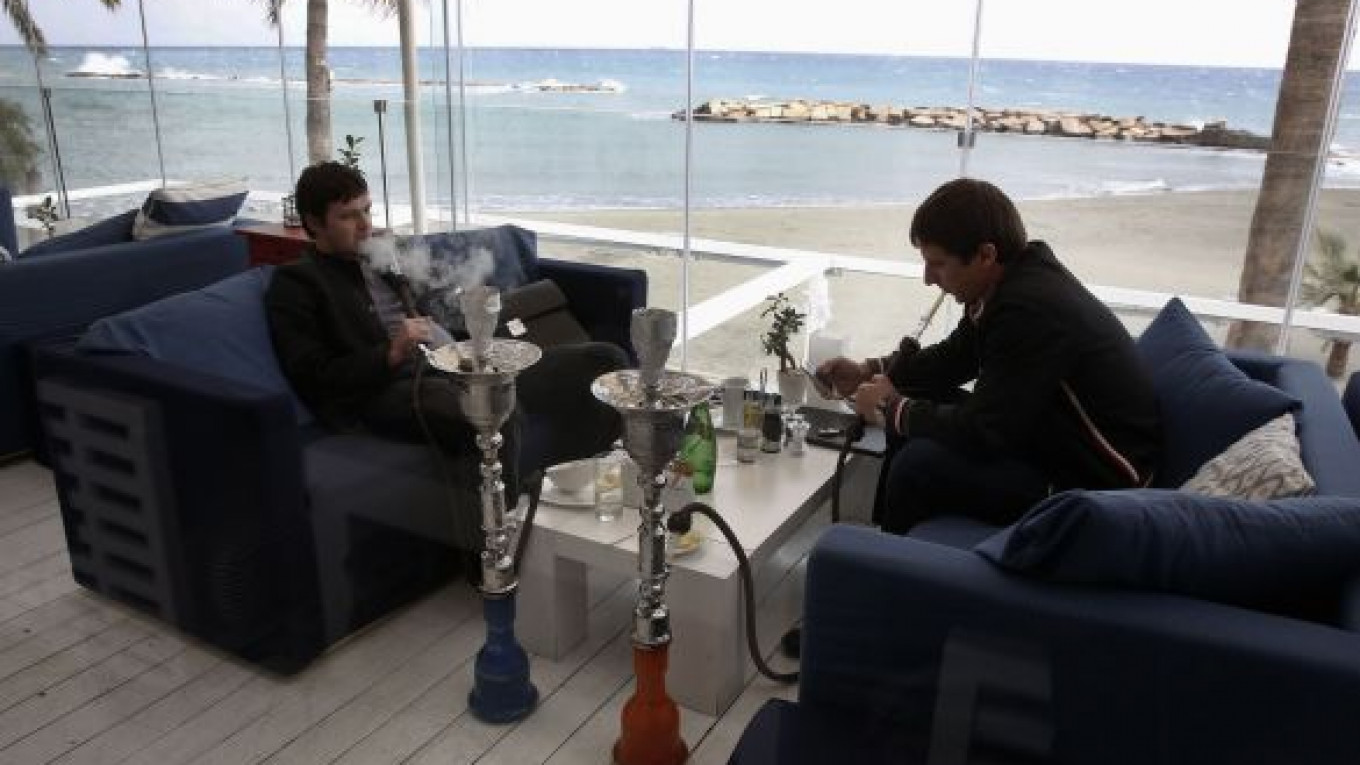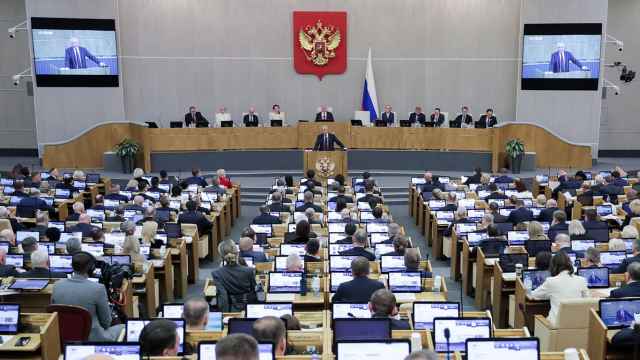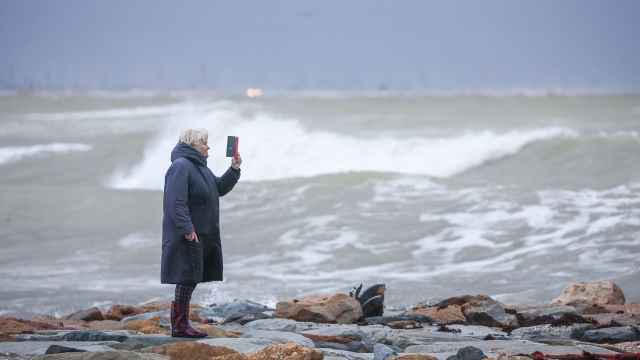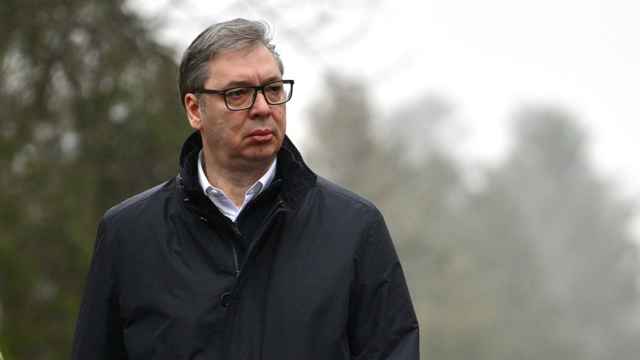LIMASSOL, Cyprus — In this seaside Cypriot town, an image of the Kremlin's onion domes adorns the doors of a local mini-market, Ferraris stand ready for hire by wealthy Russians, and shops selling mink coats line streets drenched in warm Mediterranean sunshine.
Home to more than 30,000 Russians who began flocking to Cyprus after the Soviet collapse and catering to many more tourists each year, locals jokingly refer to the town, complete with Russian signs and schools, as "Limassolgrad."
"Cyprus is a fantastic place to do business from — people are friendly and for Russians it's very convenient because every single person in Limassol speaks some Russian," said Vadim Romanov, a 28-year-old Russian property developer who says he also has business interests in restaurants in the town. "It's like I never left Russia."
Limassol, in the Greek-speaking Cypriot south, epitomizes the love affair between two Orthodox Christian nations that can be traced back to Byzantine times and is now underpinned by deep financial ties.
But those ties are coming under unprecedented scrutiny by European policymakers who question whether Cyprus is a hub for Russian money laundering, while pressing Moscow to extend its 2.5 billion euro $3.3 billion) loan to help the island avoid bankruptcy.
Eye-popping amounts of cash wash between the two countries every year — several times Cyprus' 18 billion euro national income — as Russians take advantage of a treaty that lets them pay the island's low tax rates but also raising suspicions among some EU states that complex transfers are used to launder money that was illegally earned or on which more tax should be paid.
Cyprus — which elected Conservative candidate Nicos Anastasiades as president in a run-off vote on Sunday — is still waiting on EU aid eight months after asking for help, with a bailout held up partly on German fears that the euro zone could inadvertently be bailing out wealthy Russians who have parked their money in financial institutions in Cyprus.
Eurozone finance ministers commissioned a private report this month into the island's anti-money laundering safeguards but the suggestion of illicit money flowing through Cyprus provokes reactions ranging from perplexity to fury in Limassol, where some think the EU is looking for excuses not to help out.
Allegations of money laundering are hotly denied by Cyprus, which says it got top marks in assessments by independent review bodies, such as Moneyval, an arm of the Council of Europe.
"They are making a very big injustice against Cyprus," said Andreas Neocleous, a top Cypriot lawyer who has been involved in Russian deals since setting up a Moscow office in 1991. "In this very small neighborhood and very small society, even a transfer of an amount of half a million [dollars] is known to everybody. So where is the money-laundering?"
Cyprus has dismissed the idea, aired in international media, that losses may be imposed on banks as a condition for EU aid. But Neocleous said some Russians saw a "red lamp" and began pulling money out, although others saw no sign of an exodus.
Like many on the island, Neocleous accuses fellow Europeans of hypocrisy, saying Europe and the United States take a much bigger share of Russian business than Cyprus.
"Russian business is a very big cake. Cyprus takes out of this cake … nothing," he said. "It's not even sitting at the table — it takes some rubbish that falls on the ground."
Virtual Connections
European misgivings focus on why tiny Cyprus is such a big magnet for Russian money.
Russian banks held $9 billion of their deposits abroad in Cyprus at the end of 2011. Over the last five years, Cypriot entities accounted for $60 billion, or 23 percent, of foreign direct investment into Russia, while 30 percent of Russian investment abroad was in Cyprus, according to Russian Central Bank data.
That means Cyprus — which accounted for 28 percent of the foreign direct investment stock in Russia at the end of 2011 — astonishingly invests five times the size of its economy in Russia, according to the Central Bank data, cited this month in a report by Morgan Stanley.
In reality, the links are more virtual than real, and the ultimate owner of most of Russian FDI tends to be Russian since many Russian owners simply structure firms as a Cypriot parent owning a Russian unit, Morgan Stanley said.
In other words, few Russians are investing in physical assets in Cyprus — beyond some villas and yachts — and few Cypriots are investing heavily in Russia. The figures simply reflect the flow of cash from Russia to Cyprus and back again.
Both sides say there is nothing dubious about it. The use of such vehicles is driven by factors like a 1998 Russia-Cyprus tax treaty that lets Russians pay a low 5 percent rate on dividends, the former British colony's use of English law, a reputation for "light touch" regulation and Russian political risk.
By parking assets on the island, Russians still wary of the state after 70 years of communism can also hope to shield their savings from the risk of future confiscation, analysts say.
But complex transfers cloud the origins and ownership of funds in a way familiar to money laundering investigators the world over and has fueled suspicions among wealthier EU states that Cyprus's appeal for Russians is not entirely healthy.
Just last week, the head of Russia's Central Bank complained that $49 billion was siphoned abroad last year — 2.5 percent of the national income — as a result of illegal transactions, ranging from bribes and drug deals to tax evasion.
Middle-Class Russians
In his glass-walled office decked with large flat screens, Russian businessman Romanov said Cyprus's appeal is more simple than sinister.
Tax efficiency, sunny weather, a short four-hour flight from Moscow, ease in getting a visa — or permanent residency if one buys property for more than 300,000 euros ($400,000) — and an established community that includes four Russian schools and two radio stations, all put Cyprus ahead of other centers, he said.
"From the time I step out of the door of my apartment in Moscow to the time I walk in my office here, the total trip is about five to six hours," he said. "It takes longer for me to drive from my apartment in Moscow to my country house."
Romanov said his Russian clients continued to show strong interest, expecting the euro zone to keep Cyprus afloat, and expressed confusion over the fuss about possible money-laundering.
If any Russians evaded tax by bringing money here — and he says he is convinced his clients do not — it is an issue for Russia, he says, rather than for Cyprus or for Germany, whose taxpayers will have to pay for the bulk of any EU bailout.
At any rate, most of the Russians buying properties here are middle-class, he said, with a budget of between 250,000 to 500,000 euros, rather than billionaires.
"So what money-laundering are we talking about? Of 300,000 euros?" the fresh-faced entrepreneur said with a laugh. "If they want to go after the rich Russians — go to London or Germany."
London in particular is a favored destination for Russia's super-rich, seeking homes worth tens of millions of dollars.
Pools, Heating and Schools
The influence of Russian money is plainly visible in Limassol, where large billboards in Russian advertise seaview apartments and villas with infinity pools.
At his fur shop near the seafront where minks and fox fur coats retail for up to 3,000 euros, Andreas Charalambous proudly describes his clientele: "One hundred percent Russian."
Further down the road, a car rental agency two years ago began offering Ferraris and Porsches for 1,500 euros a day, mainly to Russian tourists, whose numbers have more than doubled from three years ago to more than 474,000 last year thanks to an online visa process.
"There is huge tourism from Russia and they want supercars. Many of them have supercars at home in Russia but don't get the chance to use them," said Savvas Savva, marketing manager. "We combine sunshine, nice routes and of course an open roof — they always want the roof down because they can't at home."
Many of the swanky yachts docked at Limassol's marina are owned by Russians, who have also snapped up luxury seaview condos in high-rises where prices start at more than 1 million euros.
Gated communities — a novelty for a country with low crime levels — have also begun popping up around town, many with private pools and central heating — all unusual for Cypriots.
"For the same amount of money for an apartment in Moscow you can buy a villa near the beach here," said Christos Panagi, a Cypriot high-end property developer who showed off freshly painted townhouses with tidy gardens. Like many Cypriot men, he is married to a Russian and employs Russian speakers.
"The Russian community here feels itself a part of Cyprus," said Natalya Kardash, editor of the Vestnik Kipra weekly, one of two Russian newspapers in Cyprus. "You can't find a Cypriot who doesn't know at least one word of Russian."
Many of the Russian families in Limassol are like those of Svetlana Vasileva, a 42-year-old former accountant from Moscow. Her husband does business in Russia but moved his family here so their three children could enjoy an English school education on the island, where English remains widely spoken.
"Cyprus has the best climate, the sea is very near, and Cypriots are Orthodox Christians like Russians," said Vasileva, as she sat in her seaview apartment adorned with black-and-white family photos from Russia.
She has found Cypriots to be friendly, enjoys concerts and picnics with other Russians here and attends Russian services at a Greek Cypriot church.
"Life in Cyprus is like in a village. It's very slow," she said with a chuckle. "I'm planning to stay here all my life."
Related articles:
A Message from The Moscow Times:
Dear readers,
We are facing unprecedented challenges. Russia's Prosecutor General's Office has designated The Moscow Times as an "undesirable" organization, criminalizing our work and putting our staff at risk of prosecution. This follows our earlier unjust labeling as a "foreign agent."
These actions are direct attempts to silence independent journalism in Russia. The authorities claim our work "discredits the decisions of the Russian leadership." We see things differently: we strive to provide accurate, unbiased reporting on Russia.
We, the journalists of The Moscow Times, refuse to be silenced. But to continue our work, we need your help.
Your support, no matter how small, makes a world of difference. If you can, please support us monthly starting from just $2. It's quick to set up, and every contribution makes a significant impact.
By supporting The Moscow Times, you're defending open, independent journalism in the face of repression. Thank you for standing with us.
Remind me later.






